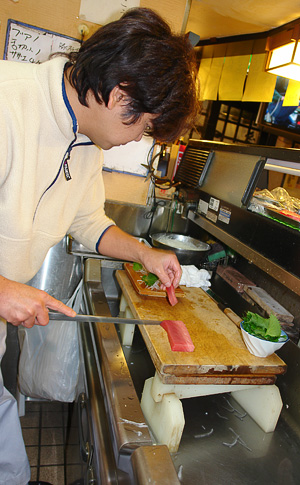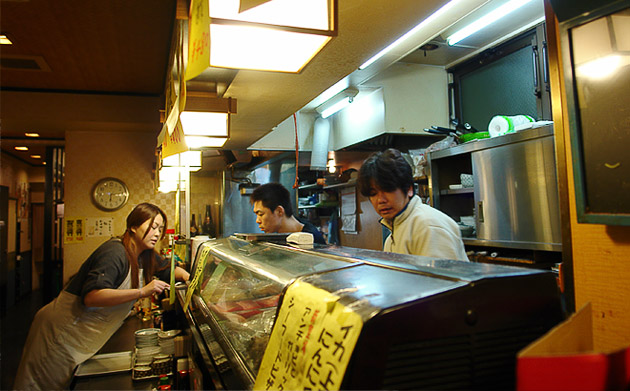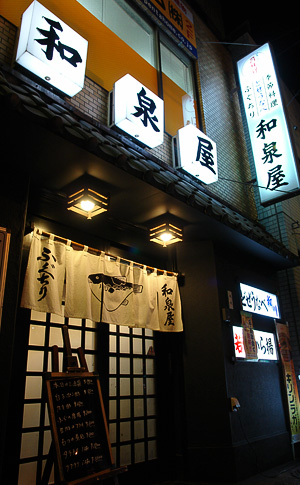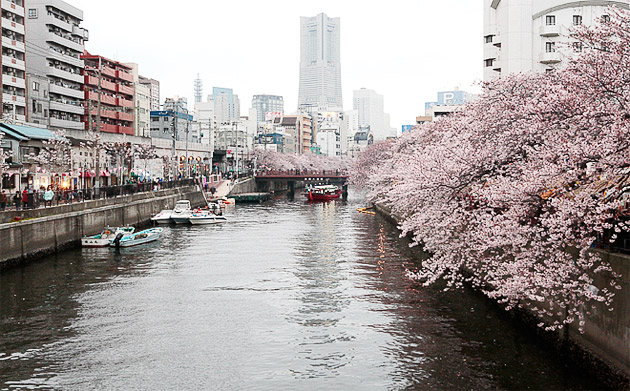Seigo Akitsu
 -- I'd like to ask about yourself and Izumiya
-- I'd like to ask about yourself and Izumiya
I was born on June 10, 1969. I'm the third generation to own this store, which at the time that I was born, my grandfather was managing. There was prostitution in Koganecho of course, but the area was also overrun with drug trafficking and to help keep it from causing trouble for the locals, police were posted under almost every streetlamp. I spent grade school in this kind of environment that was like it was straight out of a Kurosawa film. Drunks, both young and old, were common in the streets, and you tried as hard a possible to not to get involved. It was an environment where that distancing comes natural, you know.
So, in order to inherit the family restaurant, I left when I was about 20 and started training at different locations for about five years. I lived and worked at a tonkatsu restaurant in Hachioji, where I was taught the basics of the business. Then I returned to Yokohama and worked a little bit in the area around Kannai station. There, I learned how to work with fish-tank seafood. I also worked at a hotel and learned how to cook Western dishes. This was a time when there wasn't much help so the training was a lot of work, but during it all, I came across a lot of good people, made a lot of memories, and learned a great deal. You know, it was an atmosphere of a time when business was booming, and even if things were tough, if you tried your hardest, things somehow turned out.
-- To become a cook, was it common to live and train at different locations?

Not necessarily. It just happened that they weren't hiring cooks here, so I had to learn work elsewhere. I think the way it is commonly done here is that the cooks go in, watch, and learn. In my case, I think training elsewhere was a good experience. It's how I made it this far.
It's now the season for end-of-the-year parties, so I've been recommending the "nabe" (nabe is sort of "one pot" soup dish which is which a variety of vegetables and usually some meat or seafood), you know. I go to the market every morning and try to buy the freshest ingredients.
 -- What kind of customers frequent Izumiya?
-- What kind of customers frequent Izumiya?
Costumers are now anywhere from middle to upper-class. They call it 'white collar', but business men and their families are becoming more frequent. It's a business where you work face-to-face with the customers so when new people come in, you know it. Customers, who in the old day would come in, have a drink and say 'I'm heading out back', are disappearing (laughs). In those days, that's how you tell the business is booming, you know. It feels like the atmosphere has changed to where women can feel at ease coming in alone.
-- When the kind of customers that frequented the restaurant changed, was that the same time as 'Operation Bye-bye'? (Operation Bye-bye is the name for Koganecho's efforts to clean up the prostitution business)
Yeah, that was about 5 years ago. It wasn't that all of a sudden, everyone was the type of person that would have a drink and 'head out back'. But there were certainly people who came around often then that I haven't really seen since the clearance. At that time, customers came in at their own discretion, even if you didn't really tend to them. And a lot of people came too.
In those days, both sides of the main streets from here to this side of Hinode (the block next to Koganecho) would be lined with cars. And they'd be from all over, with licenses from Hachioji and Yamanashi (these are both rather far away from Yokohama - a one and half to two hour drive at least). There were even some from Nagano (laughs) (Nagano is even further than Hachioji and Yamanashi). People would stop in the middle of the street and grab a drink, they'd hang out under the overhead railroad tracks, and not return home until early morning. Pink and purple neon signs would light up the alleys, and it was like a festival for adults, you know. During the cherry blossom season, the cherry blossoms were beautifully lit up by the pink neon lights, and I remember it was an extremely whimsical atmosphere. The lit up falling cherry blossoms were just like the old days of Yoshiwara that you see on TV. In any case, it was very magical. In a way, it felt as if places like this didn't exist.
-- Was it like a kind of theme park?
I think it wasn't so much a theme park, where you go just to have fun, but rather a place where you feel like you can enjoy the atmosphere. There were a lot of areas in Yokohama with that kind of atmosphere. Even in Motomachi, even along Doubu-ita Street in Yokosuka (Yokosuka is a city south of Yokohama). There was an atmosphere specific to the particular city. It wasn't limited to just Yokohama, but I think that in the Showa era, there were a lot of towns throughout Japan that had their own unique atmosphere.
-- Do you think the shopping streets are becoming more homogenous? And why is that do you think?
Part of it is probably the economy going bad, but I think that a large part of it is that people can't afford it.
-- Can't afford 'it'?
Our generation is about working hard for a living. After all, we have to feed our kids. Just to do that much, we have buried ourselves in work, and we've come to a point where we can't afford to play around.
And what about today's kids. Do you like cars?
-- Yeah, I don't really have that sense that cars have a status (laughs).
When my girlfriend says let's go for a drive, I have to rent a car, you know. No ridiculous maintenance fees, the rental car is enough. The generation of today's youth really is living in that kind of era. The 'it' that I mentioned, it's that sense of caring about our status. In our generation, we start off with a motorcycle, and work our hardest in order to buy a car. Then, we drive our girlfriends around in that car out on dates and to go skiing.
-- People don't really spend money like that nowadays.
No, they don't. But we liked it. Back then, to a certain extent, we had money we could use just for leisure or dates. I think that's the big different between then and now.
-- Do you think people nowadays have turned to a lifestyle of just sitting in their rooms, not using money? Do you think that's making a town's unique atmosphere turn into a boring, uniform scene?
I actually do think there's that. But it's not so much about television, but since since goods and money aren't being circulate, businesses end up suffering, and wages fall. And that's probably why young people don't go out and have fun.
It's the opposite of my time ― if we went out to play, we worked later and made up the money. That's what it was like when I was training. It wasn't just the feel of the streets underneath the railroad tracks in Koganecho, but the shopping district in Hatsunecho (a block next to Koganecho) was much bigger, and they all benefited from that. It's the same everywhere, but the large stores and franchise convenience stores springing up around do everyone in.
Well, there's no way of telling how this area will turn out, but I'd really like to preserve the unique feel that I mentioned earlier.
-- Do you have times when you really felt proud of Koganechô?

Definitely the Sakura Festival. And the Summer Festival. Also, when the neighborhood night patrol came around in the evening, I think. That's an event where the night patrol go around the area saying, "Be safe with fire! [clack, clack]" (On this day, the night patrolmen promote safety with noisemakers and yelling the phrase "Hi no youjin"). With things like that, you can really feel the traces of the old days in this area. I think that's it.
-- Do you find it sad that there are only these fragments left?
I guess so...I mean, the more you build up these new apartment buildings, the more the people of yesterday disappear.
-- What are your peers from school in your neighborhood doing now?
There was someone who took over his family business from his parents, but he moved away. I guess a fair number of them have moved away. I guess I'm about the only one still doing business in the area. It's a bit sad, but everyone's built houses and apartments elsewhere and don't live here anymore.
Just recently, the person who led the local boys' club passed away. He was the one who directed this area's festivals, and he was still fairly young. It was quite a shock and very sad.
-- Do you participate in the local festivals?
If I'm asked, I gladly join in the festivities. But, with the local festivals, it's the kind of atmosphere where you can't not participate. So, I run a curry stand every year.
My dad was in charge of the mikoshi (mikoshi is a "portable" shrine carried around in festivals by the townspeople), but I think he did it because he enjoyed it.
My dad was always telling me and the new mikoshi carriers, "Live a fun life," "Don't be down, you have to live with a happy smile" - he was always telling me stuff like that. I guess that's just how he was, even though he was a Hama-ko (Hama-ko is someone from Yokohama, but this type of thinking was characteristic of Tokyoites, Edo-ko). But he really planted that conviction in me.
-- The other day, when I interviewed Mr. Tsuchiya, who runs the hardware store across the street, he said that you told him, "You have to enjoy business."
If you don't, you'll never get through to the customer. What works for you will work for the customer. If you give more than they expect, they will come to trust you more. I think this works in other industries, but that's really about business. In the restaurant business, I don't do much promotion or marketing. But even if I were to do some promotion, I'd have to enjoy it. That's why I'd never go golfing with a client (Golf is a common tool used by businesses to promote friendly relationships with their clients, Seigo Akitsu doesn't agree with mixing work into something that should be leisure). I'd much rather invite my motorcycling friends over or go to an event.
Recently, I've taken up yachting as a bit of a hobby. I just happened to make friends in that area, and so I have fun with them, and we do some business amongst ourselves, too. I mean, if you don't enjoy yourself, it's just a waste in the end.
-- Where is this yacht docked?
We all have a share in one up near Hayama (an area south of Yokohama by the ocean). We started when the locals invited us, and we got pretty into it.
It seems like someone's using it every weekend. Every week, we text around to see who's coming. Well, now it's cold and kind of a busy time, so we haven't made it out much (laughs). But those are the kind of great friends I've managed to make.
Data: 19.12.2010
Interview with Seigo Akitsu
Interviewed by Takahiro Masuzaki
Data: 12.12.2010
Interview with Kikuko Hosoi
Interviewer: Takahiro Masuzaki
Data: 19.12.2010
Interview with Seigo Akitsu
Interviewed by Takahiro Masuzaki